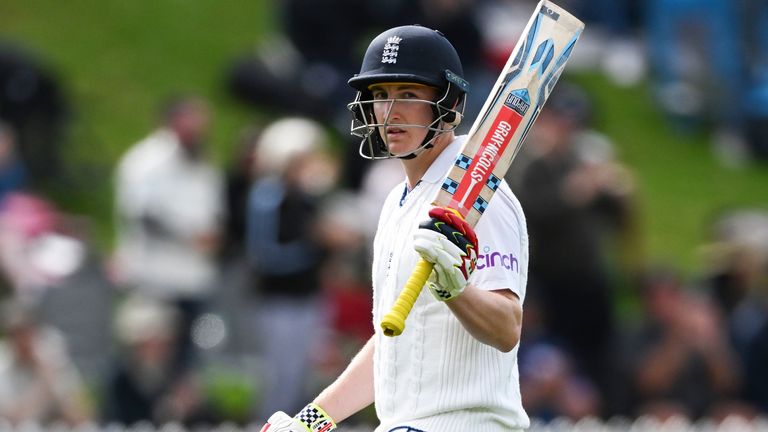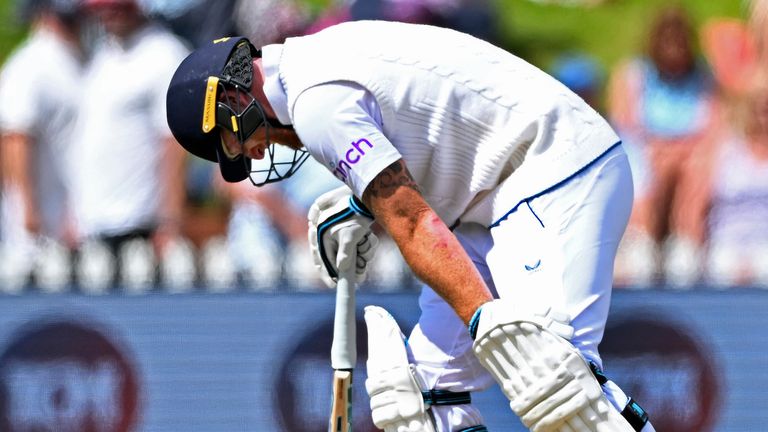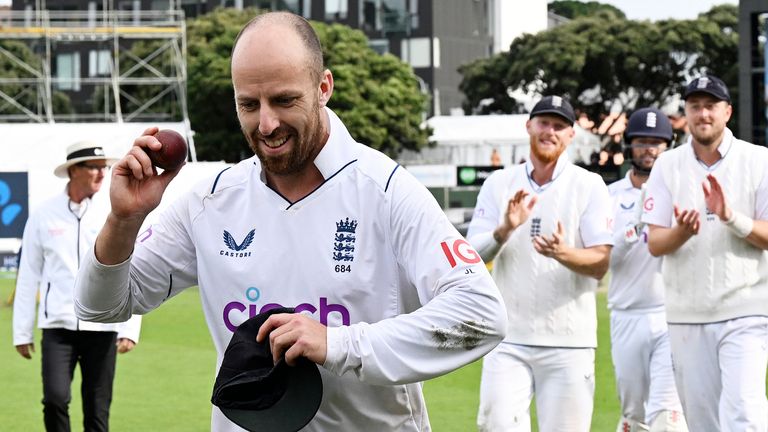England player ratings: Harry Brook, Joe Root and Jack Leach star in series against New Zealand | Cricket News
After England won the first Test but lost the second in an enthralling one-run loss, we rate the tourists’ players out of 10…
Ben Duckett – 7
First Test: 84 off 68 balls, 25 off 27 balls
Second Test: 9 off 21 balls, 33 off 43 balls
Prior to England heading out to New Zealand, there were questions around whether Duckett would be able to continue the form he showed during the 3-0 series win over Pakistan in extremely friendly batting conditions on this tour.
But the left-hander has shown himself to be a more than capable Test opener in these two matches as he built on that strong showing towards the end of last year.
The only disappointment will be that he did not quite match the highs of the first innings at Mount Maunganui where he cracked 84 off just 68 balls which included 14 fours.
Zak Crawley – 5
First Test: 2 off 12 balls, 28 off 39 balls
Second Test: 2 off 12 balls, 24 off 30 balls
The player in the team with the most question marks hanging over him after this series as Crawley once again struggled to impose himself at the top of the order for England.
His highest score of 28 on this tour came in the second innings of the first Test as England triumphed by 267 runs, while he was dismissed for single figures twice.
Head coach Brendon McCullum and captain Ben Stokes have shown faith with Crawley up to this point though and it is likely they will remain determined to help the 25-year-old fully unlock the talent he has shown glimpses of at Test level.
Ollie Pope – 7
First Test 42 off 65 balls, 49 off 46 balls
Second Test 10 off 6, 14 off 27 balls
Something of a hit and miss tour for England’s No 3 batsman, who made strong starts in both innings in the first Test but barely troubled the scorers in the second.
His 49 as England cantered to a convincing win at Mount Maunganui came off just 46 balls and included five fours and three sixes, showing how he fits into the team’s attacking philosophy.
However, he was unable to replicate that in the second Test after being dismissed for low scores, but did prove his worth in the team as a close-in fielder with a couple of spectacular catches.
Joe Root – 9
First Test 14 off 22 balls, 57 off 62 balls
Second Test 153 off 224, 95 off 113 balls
Second Test 1-29 from 12 overs
Having relinquished the captaincy last year, Root continues to show why he is considered one of the greatest players in the history of Test cricket with some stellar displays in both matches of this series.
A brilliant 153 not out to help England recover in the first innings of the second Test followed by a brisk 95 in a losing effort in the second innings went with a fine half-century to help set up victory in the first match against New Zealand.
Indeed, Root finished as England’s second-highest run-scorer in the series with a total of 319 at an average of 106.33.
Harry Brook – 9
First Test 89 off 81 balls, 54 off 41 balls
Second Test 186 off 176, 0 off 0
Second Test 1-25 from 8 overs
Undoubtedly one of the most exciting players in any form of cricket at present, Brook was named player of the series for more stunning contributions with the bat in both Tests.
Having scored half-centuries in both innings of the first, his 186 off just 176 balls in the first innings of the second Test was a blistering display which featured 24 fours and five sixes.
Even though he was run out without facing a ball through no fault of his own in the second innings in Wellington, Brook still finished as England’s leading run-scorer in New Zealand with 329. He also claimed his first Test wicket when dismissing Kane Williamson in the second innings of the second Test.
Ben Stokes – 7
First Test 19 off 28 balls, 31 off 33 balls
Second Test 27 off 28, 33 off 116 balls
Second Test 0-16 from two overs
Hampered by a knee injured which proved particularly apparent while batting during the second innings as England chased victory in Wellington, Stokes did not show his best with either the bat or ball in this series.
His four innings brought 110 runs at an average of 27.50, while the captain restricted himself to bowling just nine overs across both matches.
There will be a few critics questioning the decision to enforce the follow-on in Wellington as well after New Zealand ended up triumphing by one run, although it is likely he will pay little heed to them given the extraordinary success the team have otherwise enjoyed so far in his reign.
Ben Foakes – 7
First Test 38 off 56 balls, 51 off 80 balls
Second Test 0 off 5, 35 off 57 balls
The debate will no doubt rage as to whether Foakes should continue in the team when Jonny Bairstow returns from injury, but the wicketkeeper is proving himself to be an assured presence.
He recorded six dismissals behind the stumps during the two-match series against New Zealand and has given Stokes and McCullum plenty to consider when it comes to their wicketkeeping options.
Foakes is a useful lower-order batter too, although only made the one half-century, which came in the first Test.
Ollie Robinson – 7
First Test 4-54 from 19 overs, 1-34 from eight overs
Second Test 0-31 from 12 overs, 1-84 from 28 overs
First Test 15no off 11 balls, 39 off 48 balls
Second Test 18 off 29 balls, 2 off 15 balls
Robinson did not quite kick on from the highs of the first innings of the first Test where he took four wickets, but he bowled economically across both games.
He was unfortunate not to take more wickets in the second Test particularly, which would have been a just reward for how well he would otherwise bowl.
The 29-year-old has firmly put his name in contention for this summer’s home Tests against Ireland and Australia, with Mark Wood and Jofra Archer both expected to be available again then.
Stuart Broad – 8
First Test 1-72 from 17 overs, 4-49 from 15 overs
Second Test 4-61 from 14.2 overs, 1-29 from 24 overs
Second Test 14 off 17 balls, 11 off 9 balls
One of three England bowlers to finish with 10 wickets during this tour, it is hard to believe barely a year ago there were questions about whether his international career was over.
At 36, however, Broad continues to form a dangerous opening partnership with James Anderson and was in particularly devastating form during the second innings of the first Test as England triumphed.
He followed those four wickets up with another four in the first innings of the second Test in Wellington, although ultimately it was New Zealand who came out on top in that game.
James Anderson – 8
First Test 3-36 from 16.5 overs, 4-18 from 10.3 overs
Second Test 3-37 from 10 overs, 0-77 from 27 overs
Second Test 4 off 6 balls (second innings)
The other half of England’s new-ball partnership bowled so well during the first Test, taking match figures of 7-54, that he returned to the No 1 spot in the world Test rankings for bowlers.
The second Test did not prove quite as fruitful, but the 40-year-old still finished the series with 10 wickets to his name at an average of 16.80 and an economy rate of 2.61 runs per over.
He and Broad now hold the record for the most effective bowling partnership in Test history too, with over 1,000 wickets between them.
Jack Leach – 8
First Test 1-84 from 18 overs,1-25 from 11 overs
Second Test 3-80 from 17 overs, 5-157 from 61.3 overs
Second Test 5 off 6 balls, 1 off 31 balls
The left-arm spinner is a player who seems to constantly have his place in the team being questioned, yet time and again proves his worth to the side.
Leach bowled particularly effectively in a losing effort in the second Test, taking match figures of 8-237 including a five-for in New Zealand’s second innings.
In total, he claimed 10 wickets across the two matches with an economy rate of 3.21 runs per over from the team-high 107.3 overs he bowled across those Tests.
What’s next?
England’s white-ball team are currently in Bangladesh for a tour which comprises three one-day internationals and three T20 internationals, and starts on March 1. England’s next Test match is against Ireland at Lord’s, starting on Thursday, June 1.







Pingback: Biald Alrafidain University
Pingback: see here now
Pingback: mostbet
Pingback: Plinko 1000
Pingback: mostbet yüklə
Pingback: Las Vegas SEO